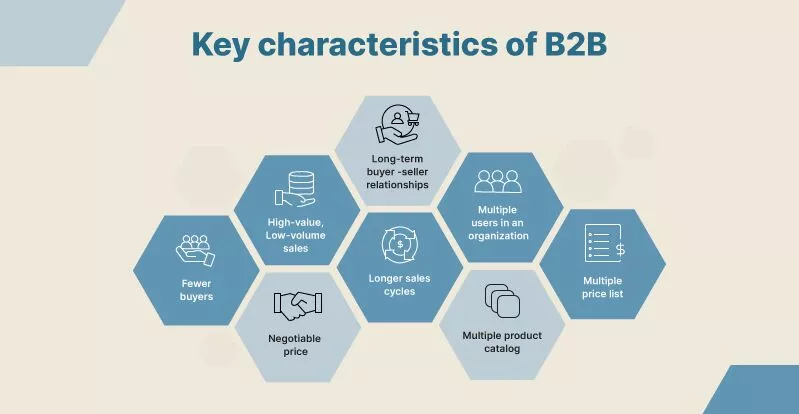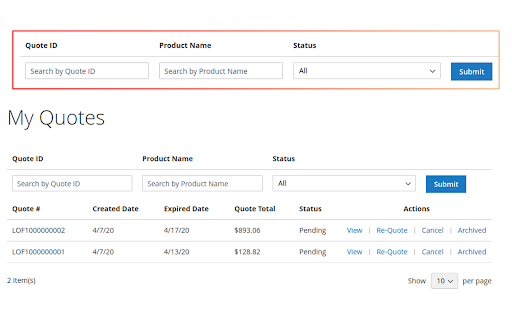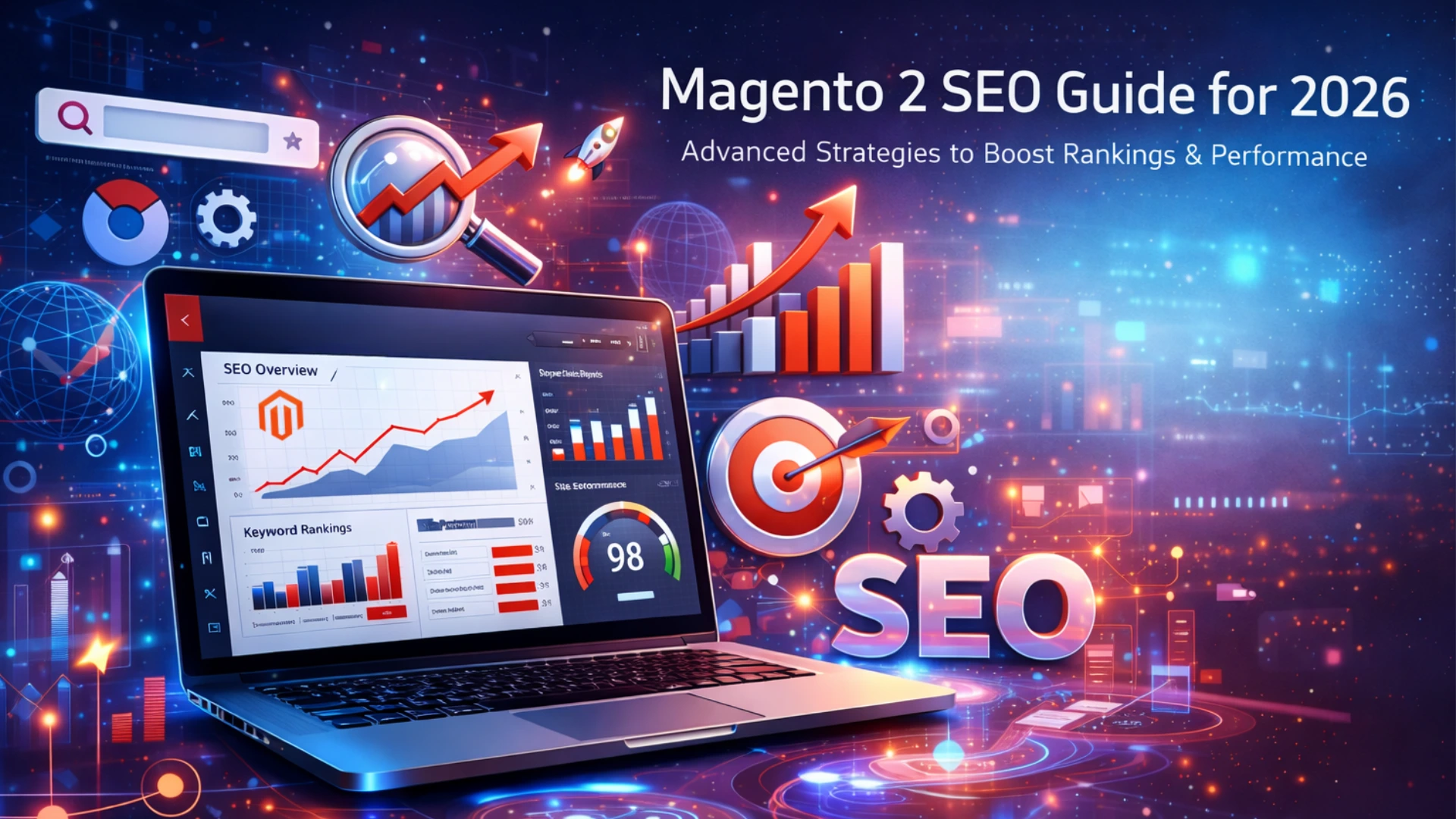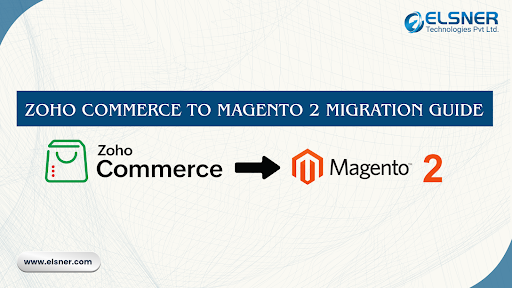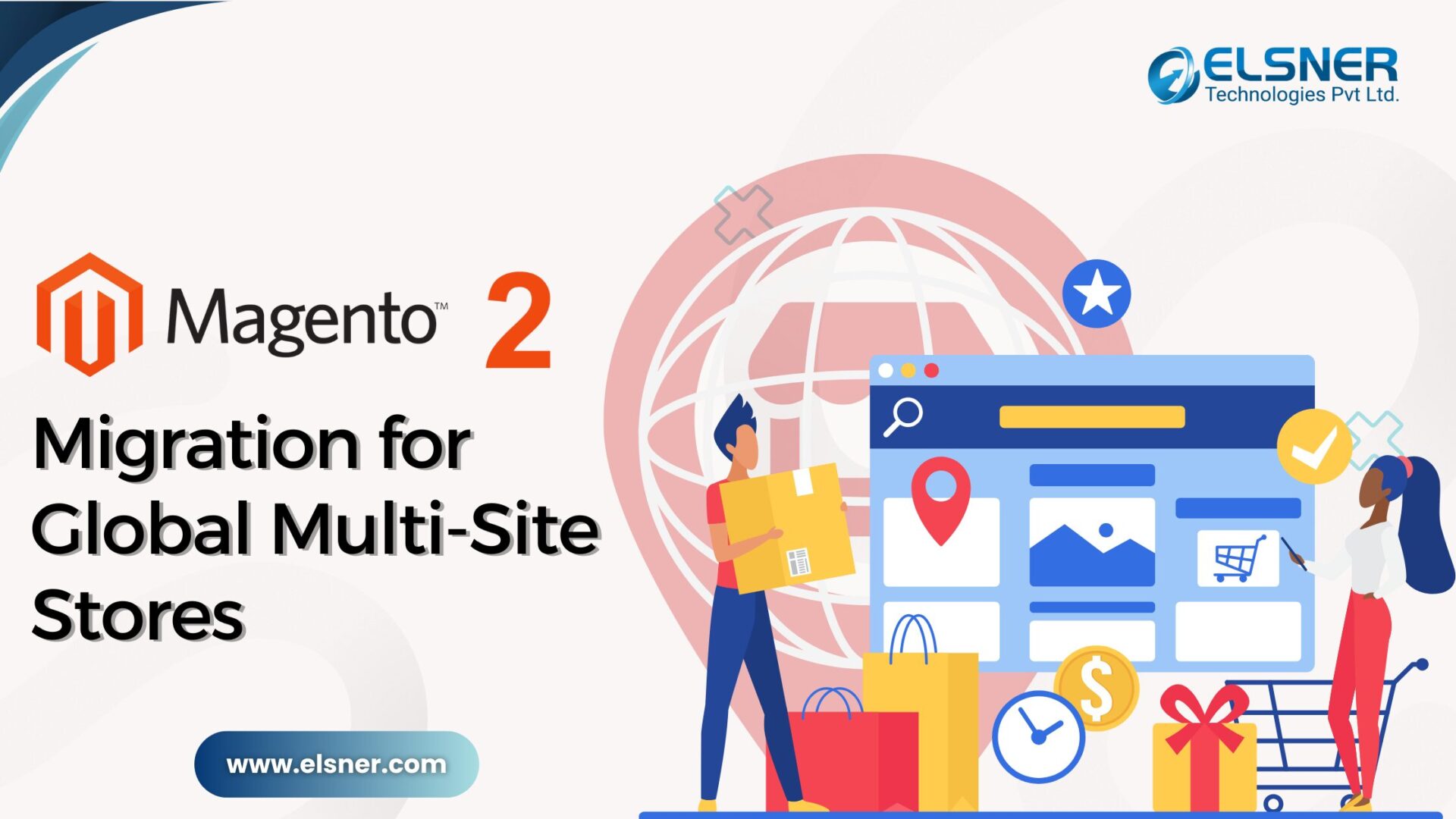- What are the different characteristics of B2B customers?
- What is the Behavior of B2B customers?
- Purchasing habits of B2B customers :
- Some useful insights:
- What is the Flow of B2B in Adobe Magento 2?
- 1. Registration:
- 2. Approval:
- 3. Product browsing:
- 4. Negotiation and quoting:
- 5. Purchase order creation:
- 6. Payment:
- 7. Order processing:
- 8. Reordering:
- What are the key features of B2B?
- Custom pricing
- Tiered pricing:
- Account management:
- Requisition lists:
- Quick order:
- What are the Benefits of B2B in Adobe Magento 2?
- 1. Streamlined operations:
- 2. Increased efficiency:
- 3. Improved customer experience:
- 4. Increased revenue:
- How B2B in Adobe Magento 2 can help your business grow?
- 1. Improved customer experience:
- 2. Increased efficiency:
- 3. Expanded market reach:
- 4. Better data insights:
- Difference between B2B vs. B2C in Adobe Magento 2
- Target audience:
- Purchasing process:
- Quantity and pricing:
- Product Catalog:
- Payment and shipping methods:
- User access and roles:
- Customer service:
- What are the Top Reasons to Choose Adobe Magento 2 for B2B Businesses?
- 1. Advanced Security:
- 2. Open-Source Platform:
- 3. SEO-Friendly:
- 4. Mobile-Friendly:magento development services
- 5. Scalability:
- 6. High-Quality Reporting:
- 7. Technical Support:
- 8. Simple Order Management:
- 7. Fast Web Speed:
- 8. Multiple Extension Options:
- Conclusion
- FAQ’s
- What is Magento B2B Commerce and how does it differ from B2C platforms?
- How can Magento B2B Development enhance business operations?
- What should businesses look for in a B2B Magento Agency?
- How do B2B Magento Developers customize features for specific business needs?
- What are the benefits of using B2B Ecommerce Magento for large-scale operations?
- Why should businesses choose a specialized Magento B2B Agency over general developers?
- What are the key features that make Magento ideal for B2B Commerce?
- How long does typical Magento B2B Development take to complete?
- What ongoing maintenance does B2B Ecommerce Magento require?
- How does Magento B2B Commerce handle complex pricing structures?
- What integration capabilities does a B2B Magento Agency typically offer?
- How do B2B Magento Developers ensure platform security for business transactions?
- What are the common challenges in B2B Ecommerce Magento implementation?
- How can Magento B2B Development improve customer experience?
- What ROI can businesses expect from partnering with a B2B Magento Agency?
- How does Magento B2B Commerce support international business operations?
B2B features in Adobe Magento 2 are designed to support the requirements of businesses that sell to other businesses, such as wholesalers, manufacturers, and distributors.
It is a popular e-commerce platform that supports businesses of all sizes to sell their products and services online.
While Magento Development is often associated with business-to-consumer (B2C) e-commerce, it also offers powerful business-to-business (B2B) functionality specifically designed to support the unique needs of businesses that sell to other businesses.
This refers to the set of features and functionalities specifically designed to support businesses that sell to other businesses. While many of the features in Adobe Magento 2 are geared towards B2C e-commerce, B2B functionality is focused on meeting the unique needs of B2B sellers, such as wholesalers, manufacturers, and distributors.
What are the different characteristics of B2B customers?
[Image Source: https://bit.ly/3H2lKXp]
B2B customers differ from B2C customers in many ways. They typically purchase products or services to support their business operations rather than for personal use. B2B customers often make larger purchases than B2C customers and are typically less price-sensitive, prioritizing quality and reliability instead.
They often require customized solutions to meet their specific needs, and they prefer to work with companies that provide personalized service and support. They are also more likely to develop long-term partnerships with suppliers who can help them optimize their operations and achieve their business objectives.
What is the Behavior of B2B customers?
[Image Source: https://bit.ly/3USpel2]
These customers are more likely to conduct extensive research before purchasing, as their decisions can significantly affect their operations. They often rely on multiple sources of information, including industry publications, trade shows, and online reviews, to inform their decision-making.
B2B customers are also more likely to directly communicate with potential suppliers, often through sales representatives, to gather additional information and negotiate terms. The decision-making process for B2B customers can be lengthy, involving multiple stakeholders and decision-makers.
Purchasing habits of B2B customers :
There are chances that they will have more complex purchasing habits than B2C customers. They may require customization or specialized services, additional negotiations, and supplier coordination. B2B customers also prioritize long-term relationships and value-added services like training or technical support.
Purchasing decisions are often made by a group of decision-makers within the organization rather than a single individual. This group may include executives, purchasing managers, and technical experts, each with priorities and concerns. Budget constraints, business goals, and competitive pressures can influence decision-making.
Some useful insights:
1. Relationship building is crucial:
They often seek out long-term relationships with suppliers, as they require ongoing support and services. Building a strong relationship with B2B customers can lead to repeat business, referrals, and partnerships.
2. Trust is key:
These customers make large purchases that significantly affect their operations. They must trust their suppliers to deliver high-quality products and services and respond to their needs. Building trust can take time, but it’s essential for long-term success in the B2B market.
3. Quality and reliability are priorities:
They tend to be less price-sensitive than B2C customers but highly value quality and reliability. They need products and services that meet their specific needs and can be relied on to perform consistently over time.
4. Personalization is important:
There are chances that they will require customized solutions to meet their specific needs. They want suppliers who can provide personalized service and support and are willing to work with them to develop solutions that meet their unique requirements.
5. The decision-making process is complex:
Purchasing decisions often involve multiple stakeholders with priorities and concerns. Suppliers need to be able to navigate this complex decision-making process and tailor their approach to the needs of each stakeholder.
6. Ongoing support is essential:
They often require ongoing support and services, such as training or technical support. Suppliers who can provide these value-added services are more likely to build strong relationships with their B2B customers.When you become familiar with the needs and preferences of B2B customers, businesses can develop effective marketing strategies and build long-term relationships with their clients. B2B customers require personalized service, trust, and ongoing support, and suppliers who can deliver on these requirements are more likely to succeed in the competitive B2B market.
What is the Flow of B2B in Adobe Magento 2?
Let us look at the simple procedure:
1. Registration:
The first step is for the business customer to register on the website by providing company details and other necessary information.
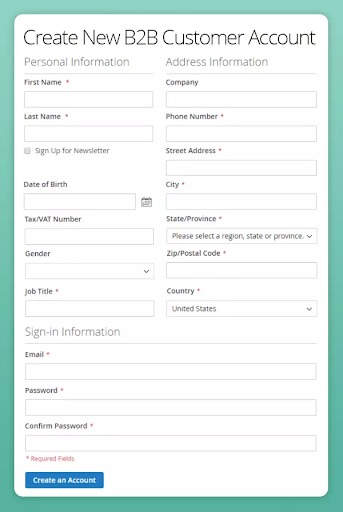
2. Approval:
After registration, the administrator must approve the business customer’s account. Once approved, the customer can log in to their account and browse the products.
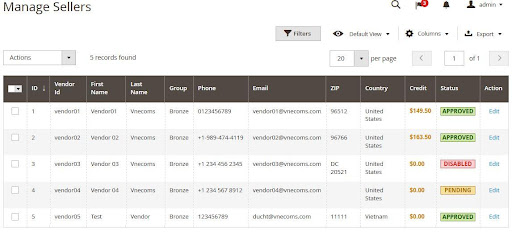
3. Product browsing:
The business customer can browse the products and services on the website and add them to their cart.
4. Negotiation and quoting:
In B2B transactions, negotiation is a common practice. So, the business customer can request a quote for the products they are interested in. The seller can then negotiate the price with the customer and provide a custom quote.
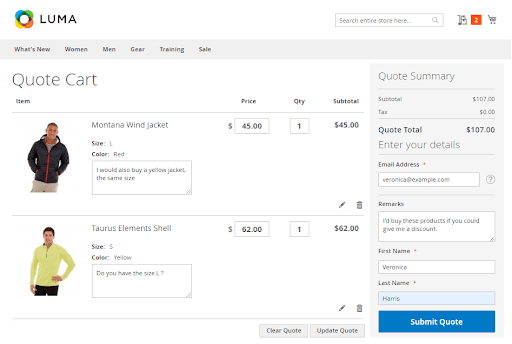
5. Purchase order creation:
After the negotiation, the business customer can create a purchase order based on the negotiated price and terms.
6. Payment:
The business customer can pay using the available payment methods on the website.
7. Order processing:
Once the payment is made, the seller can process the order and deliver the products to the customer.
8. Reordering:
In B2B transactions, reordering is a common practice. So, the business customer can easily reorder the previously purchased products by logging in to their account and selecting the products.Overall, the flow of B2B transactions in Adobe Magento 2 is similar to the standard e-commerce flow but with additional features like quoting and negotiation to accommodate the specific needs of business customers.
What are the key features of B2B?
-
Custom pricing
Users can set up custom customer pricing based on their relationship, order history, and other factors. This allows businesses to offer personalized pricing that reflects their customer’s needs and preferences and their business goals.

-
Tiered pricing:
With the right permissions, users can create tiered pricing structures that offer discounts based on order volume or other criteria. This is a powerful way to incentivize customers to order more products and reward loyal customers with lower prices.
-
Account management:
If required business owners can have multiple user accounts and assign different roles and permissions to each user, allowing for easy management of large and complex organizations. This is particularly useful for businesses with multiple stakeholders, such as procurement departments, finance teams, and sales representatives.
-
Requisition lists:
Building requisition lists for commonly ordered items simplifies the ordering process for customers and reduces the chance of errors. This feature is especially useful for businesses with a large number of SKUs or selling products that are frequently reordered.
-
Quick order:
Businesses can offer a quick order feature that allows customers to add multiple items to their cart at once using a CSV file or other format. This is useful for businesses that sell products in bulk or that have a large number of SKUs.
What are the Benefits of B2B in Adobe Magento 2?
1. Streamlined operations:
Adobe Magento 2 helps businesses streamline their operations by automating many of the tasks associated with B2B selling, such as account management, pricing, and ordering.
2. Increased efficiency:
B2B features in Adobe Magento 2 help businesses increase efficiency by reducing the time and effort required to manage B2B relationships. This allows businesses to focus on more strategic activities like sales and marketing.
3. Improved customer experience:
B2B features in Adobe Magento 2 help businesses increase efficiency by reducing the time and effort required to manage B2B relationships. This allows businesses to focus on more strategic activities like sales and marketing.
4. Increased revenue:
Businesses increase revenue by incentivizing customers to order more products and making it easier for them to do so.
How B2B in Adobe Magento 2 can help your business grow?
Adobe Magento 2 is a popular e-commerce store with great features and functionalities to help businesses grow online. One of the key benefits of Adobe Magento 2 is its robust B2B capabilities, which can help businesses reach new customers, streamline their operations, and increase sales. Here are some ways in which B2B in Adobe Magento 2 can help your business grow:
1. Improved customer experience:
The platform offers a range of B2B-specific features, such as custom pricing, account management, and order tracking that can help businesses provide a personalized and seamless customer experience. This can help increase customer satisfaction and loyalty, leading to higher sales and repeat business.
2. Increased efficiency:
Businesses can easily automate their sales and marketing processes, such as pricing, inventory management, and order processing. This can help save time and reduce errors, increasing efficiency and productivity.
3. Expanded market reach:
Adobe Magento 2’s B2B features allow businesses to create custom catalogs, set pricing and shipping rules, and offer personalized promotions to specific customer groups. This can help businesses target new markets and expand their reach, increasing sales and revenue.
4. Better data insights:
It has the capabilities to offer advanced reporting and analytics tools that will help monitor sales and inventory levels and analyze customer behavior. This helps businesses make informed decisions and optimize their operations for better performance and profitability.Overall, B2B in Adobe Magento 2 is a powerful tool that will help businesses grow and expand their online presence. By providing a seamless customer experience, increasing efficiency, expanding market reach, and offering better data insights, businesses can optimize their operations and drive growth in the highly competitive e-commerce landscape.
Difference between B2B vs. B2C in Adobe Magento 2
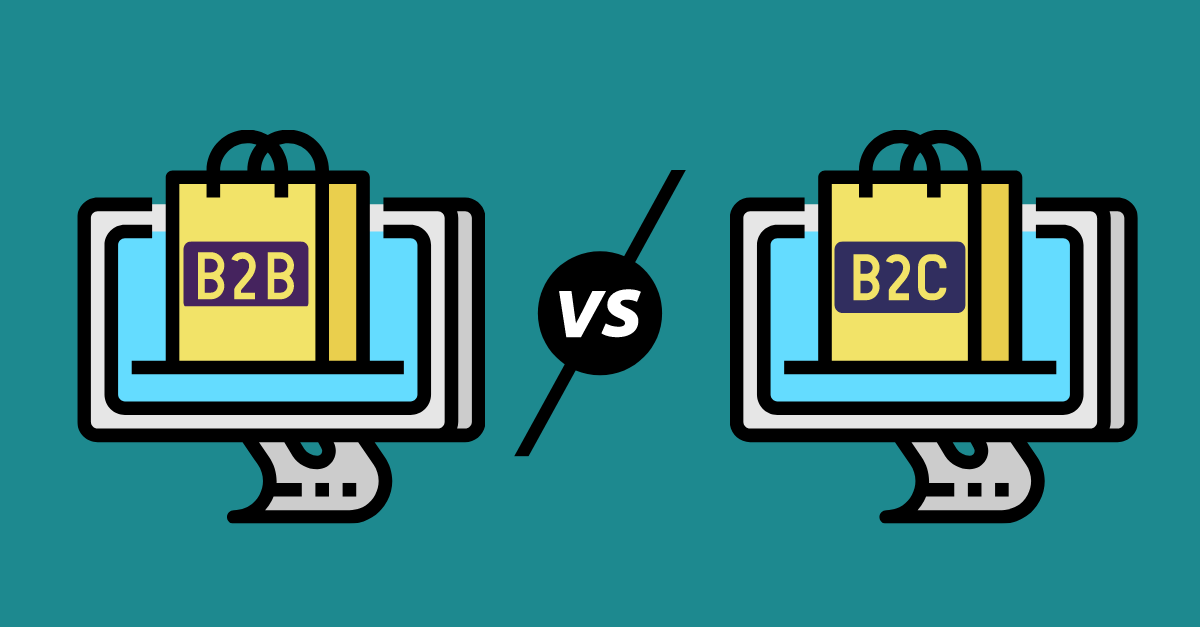
Target audience:
- B2B targets other businesses
- B2C targets individual consumers.
Purchasing process:
- B2B involves complex purchasing processes, such as multi-level approvals, custom quotes, and negotiated contracts
- B2C involves simpler purchasing processes with little customization, approvals, or contracts.
Quantity and pricing:
- B2B products or services are sold in bulk with customized pricing
- B2C products or services are sold in smaller quantities at fixed prices.
Product Catalog:
- B2B often has a more complex product catalog with a wider range of products and variations
- B2C has a simpler product catalog with fewer variations.
Payment and shipping methods:
- B2B often requires more complex payment and shipping methods, such as account-based invoicing and custom shipping
- B2C has standard payment and shipping methods.
User access and roles:
- B2B allows for multiple user access and roles with different levels of permissions,
- B2C typically only has one user per account.
Customer service:
- B2B often requires more personalized customer service and support due to the complex purchasing process
- B2C customer service is often simpler.
Overall, B2B and B2C structures in Adobe Magento 2 have different target audiences, purchasing processes, product catalogs, pricing, and features to cater to their audiences’ unique needs.
What are the Top Reasons to Choose Adobe Magento 2 for B2B Businesses?
1. Advanced Security:
Magento 2 provides advanced security features through a security center with good security patches, practices, updates, and compliance regulations. Magento also implements an SSL security system and IP to keep you and your customers safe online.
2. Open-Source Platform:
It is an open-source platform for B2B business development and eCommerce business. Businesses can customize the free platform to their needs and tailor a unique customer experience.
3. SEO-Friendly:
Being an SEO-friendly platform, it offers high-quality assistance to help you improve your company’s Search Engine Optimization Strategy. Since SEO is essential to your online success, Magento 2 is a powerful solution for struggling SEO campaigns.
4. Mobile-Friendly:magento development services
Magento 2 offers a mobile-friendly design to optimize the customer experience when interacting with your B2B business on a smartphone or mobile device. A negative or confusing mobile experience makes customers 62% less likely to purchase from your eCommerce website in the future.
5. Scalability:
Magento 2 is scalable and helps B2B development through optimized web pages and efficient backend operations. Magento 2 allows B2B companies to develop by starting with a free version of the service and offering new options and features as the organization grows into an enterprise.
6. High-Quality Reporting:
Magento report provides insights into your online orders, customers, and products and constantly updates the data to help you manage your business.
7. Technical Support:
It has exceptional technical support and end-to-end maintenance to ensure your website runs smoothly. Any errors encountered can be resolved quickly with the help of Magento’s team.
8. Simple Order Management:
Magento 2 offers feature to simplify order management from a single platform. Management includes currency features, shipping details, international support, and comprehensive inventory management.
7. Fast Web Speed:
Magento aims to provide the fastest eCommerce experience to speed up your website and craft an excellent customer experience. Fast loading is essential to the success of your B2B company, and many potential customers will leave your site if it doesn’t load fast.
8. Multiple Extension Options:
Magento 2 offers advanced extension options to improve B2B business developmenmit and manage daily activities for eCommerce businesses. These extensions offer critical benefits for B2B business development.
Conclusion
In conclusion, to be objective, Adobe Magento 2 is an ideally suitable platform for running your B2B business. What’s operating smoothly with the open source easily upgrading according to the development of business, unlimited functions to use, customization for each specific business type, and the core value is that Adobe Magento 2 supports excellently almost unique way.
FAQ’s
-
What is Magento B2B Commerce and how does it differ from B2C platforms?
Magento B2B commerce focuses on business-to-business sales. B2C platforms target individual shoppers. B2B platforms handle bulk orders and complex pricing. They support approval workflows and company accounts. B2B customers need custom catalogs and negotiated contracts. The buying process takes longer and involves multiple decision-makers.
-
How can Magento B2B Development enhance business operations?
Magento B2B development automates repetitive tasks. It reduces manual order processing. Custom pricing becomes automatic. Approval workflows speed up purchases. Integration with existing systems saves time. Inventory management becomes more accurate. Customer service improves through self-service options.
-
What should businesses look for in a B2B Magento Agency?
A good B2B Magento agency has specific experience with business sales. They understand complex pricing structures. The team includes certified Magento developers. They offer ongoing support after launch. Previous clients provide positive references. The agency integrates with existing business systems. They know industry-specific requirements well.
-
How do B2B Magento Developers customize features for specific business needs?
B2B Magento developers build custom modules for unique processes. They connect Magento to existing business software. Complex pricing rules get programmed into the system. Multi-step approval workflows become automated. User permissions match company hierarchies. Custom reports track important business metrics. Payment terms reflect actual business relationships.
-
What are the benefits of using B2B Ecommerce Magento for large-scale operations?
B2B ecommerce Magento handles thousands of products efficiently. Multiple warehouses connect to one system. Large order volumes process smoothly. The platform grows with business expansion. Enterprise security protects sensitive data. Detailed reporting helps make better decisions. Performance stays fast even with heavy usage.
-
Why should businesses choose a specialized Magento B2B Agency over general developers?
A specialized Magento B2B agency understands business sales cycles. They know procurement processes and buyer behavior. Certified developers follow best practices. Industry experience prevents common mistakes. Ongoing support keeps systems running smoothly. Strategic advice helps maximize investment returns. B2B expertise saves time and money.
-
What are the key features that make Magento ideal for B2B Commerce?
Magento B2B commerce supports company account structures. Multiple users share one company account. Custom catalogs show relevant products only. Quote systems handle price negotiations. Requisition lists speed up repeat orders. Credit terms match business relationships. Bulk ordering saves time on large purchases.
-
How long does typical Magento B2B Development take to complete?
Basic Magento B2B development takes 2-3 months. Standard features and simple customization finish quickly. Medium projects need 3-6 months for integrations. Complex enterprise projects take 6-12 months. Data migration affects timeline significantly. Third-party integrations add development time. Testing requirements vary by project complexity.
-
What ongoing maintenance does B2B Ecommerce Magento require?
B2B ecommerce Magento needs regular security updates. Performance optimization keeps the site fast. New features require periodic updates. System integrations need ongoing monitoring. User training helps adopt new capabilities. Analytics reviews identify improvement opportunities. Database maintenance prevents slowdowns.
-
How does Magento B2B Commerce handle complex pricing structures?
Magento B2B commerce supports volume discounts automatically. Customer groups get different price levels. Contract pricing honors negotiated rates. Geographic regions have specific prices. Seasonal promotions run on schedule. Dynamic pricing adjusts to inventory levels. Multiple currencies work simultaneously.
-
What integration capabilities does a B2B Magento Agency typically offer?
A professional B2B Magento agency connects ERP systems seamlessly. CRM platforms sync customer data automatically. Accounting software updates financial records. Inventory systems share stock levels in real-time. Payment gateways handle business transactions. Shipping carriers provide accurate rates and tracking.
-
How do B2B Magento Developers ensure platform security for business transactions?
B2B Magento developers install SSL certificates for encryption. Two-factor authentication protects login access. User permissions control data access carefully. Regular security audits find vulnerabilities early. Compliance standards meet industry requirements. API connections use secure protocols consistently.
-
What are the common challenges in B2B Ecommerce Magento implementation?
B2B ecommerce Magento implementations face data migration complexity. Existing systems need careful integration planning. Users require training on new processes. Large catalogs can slow performance without optimization. Custom workflows must match existing business practices. Comprehensive testing takes significant time.
-
How can Magento B2B Development improve customer experience?
Magento B2B development enables customer self-service capabilities. Account management becomes available 24/7. Personalized catalogs show relevant products only. Quick ordering tools save valuable time. Mobile access works from anywhere. Real-time information keeps customers informed. Multiple users share company accounts easily.
-
What ROI can businesses expect from partnering with a B2B Magento Agency?
A B2B Magento agency typically delivers measurable results. Order processing time drops by 25-40%. Sales often increase 15-30% through better customer experience. Order errors decrease by 50-70% with automation. Customer retention rates improve significantly. New market opportunities become accessible. Administrative costs decrease substantially.
-
How does Magento B2B Commerce support international business operations?
Magento B2B commerce handles multiple currencies automatically. Language translations localize content effectively. Tax calculations work across different jurisdictions. International shipping integrates with global carriers. Compliance features meet various regulations. Regional pricing strategies work independently.

About Author
Dipak Patil - Delivery Head & Partner Manager
Dipak is known for his ability to seamlessly manage and deliver top-notch projects. With a strong emphasis on quality and customer satisfaction, he has built a reputation for fostering strong client relationships. His leadership and dedication have been instrumental in guiding teams towards success, ensuring timely and effective delivery of services.


